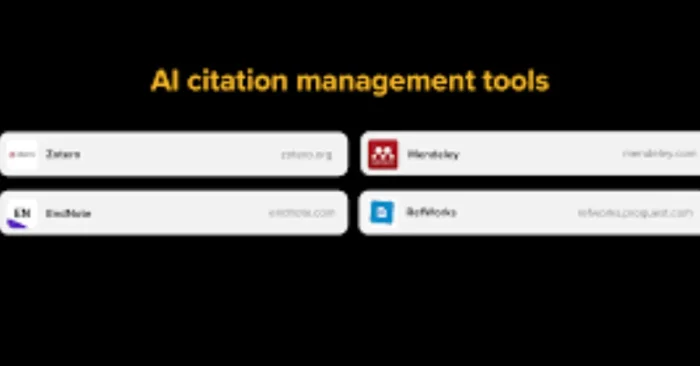Overview
AI tools for citation management help students, researchers, and professionals organize, generate, and manage references efficiently. Instead of manually formatting citations, AI automates the process by supporting multiple styles such as APA, MLA, Chicago, and Harvard. These tools can scan research papers, articles, or books to extract bibliographic details instantly. By integrating with writing platforms, AI ensures accuracy and saves time. Researchers benefit from streamlined reference lists, while businesses and academics maintain professionalism in their documents. With features like cloud storage, collaboration, and plagiarism prevention, AI-powered citation managers improve productivity, consistency, and credibility in academic and professional writing.
1. AI in Automatic Citation Generation
AI tools generate citations instantly by extracting details from URLs, DOIs, or uploaded files. This saves time and reduces human error. Students benefit by avoiding formatting mistakes, while researchers ensure their references are always accurate. Automation simplifies the otherwise tedious citation process.
2. AI for Multi-Style Formatting
AI citation tools support different referencing styles such as APA, MLA, Harvard, and Chicago. Users can switch between formats with a single click. This flexibility benefits academics working with journals, institutions, or publishers that require specific styles. Small mistakes in formatting are eliminated, ensuring professional accuracy.
3. AI in Reference Organization
AI citation managers allow users to store, tag, and categorize references in one place. By using cloud storage, researchers can access citations across multiple devices. Organized reference libraries make it easier to manage long research projects, theses, or collaborative papers efficiently.
4. AI for Collaboration
Many AI-powered citation management tools allow multiple users to collaborate on shared reference libraries. Research groups, academic teams, and students working on joint projects benefit from this feature. Collaboration ensures consistency and prevents duplication of effort in citation management.
5. AI in Integration with Writing Tools
AI citation tools integrate with platforms like Microsoft Word, Google Docs, and LaTeX, enabling automatic in-text citations and reference list generation. This reduces manual work and ensures seamless writing experiences. Researchers and professionals save time while producing well-structured documents.
6. AI for Metadata Extraction
AI can scan PDFs, books, or articles to extract bibliographic information such as author names, publication year, and journal titles. This prevents errors and speeds up data entry. Researchers handling large volumes of sources benefit the most from automated metadata extraction.
7. AI in Duplicate Detection
AI citation managers identify duplicate references within libraries and suggest merging them. This feature keeps research libraries clean and avoids confusion. Students, academics, and professionals maintain accurate and efficient reference lists without redundancy.
8. AI for Plagiarism Prevention
By ensuring proper citations, AI tools help reduce plagiarism risks. They highlight missing references and suggest corrections. Students benefit by maintaining academic integrity, while researchers and businesses avoid unintentional copyright issues. Proper citation builds credibility and trust in published work.
9. AI in Recommendation Systems
Some AI citation managers suggest related articles or references based on a user’s research topic. This helps researchers discover relevant sources quickly. Recommendation systems save time in literature review and expand access to valuable academic resources.
10. AI for Real-Time Updates
AI citation tools update reference databases automatically to ensure accuracy. If an online article changes metadata or a DOI, AI refreshes the information in real-time. This keeps citations current and reliable, benefiting both students and professionals in dynamic research fields.
(FAQs)
Q1: Can AI citation tools handle different citation styles?
Yes. Most AI citation tools support APA, MLA, Harvard, Chicago, and other major styles, allowing quick switching between formats.
Q2: Do AI tools integrate with Word or Google Docs?
Yes. Many AI citation managers integrate with writing software to automate in-text citations and bibliographies.
Q3: Are AI citation tools free to use?
Some tools offer free versions with limited features, while advanced options require subscriptions for full functionality.
Learn More About AI Course https://buhave.com/courses/learn/ai/






